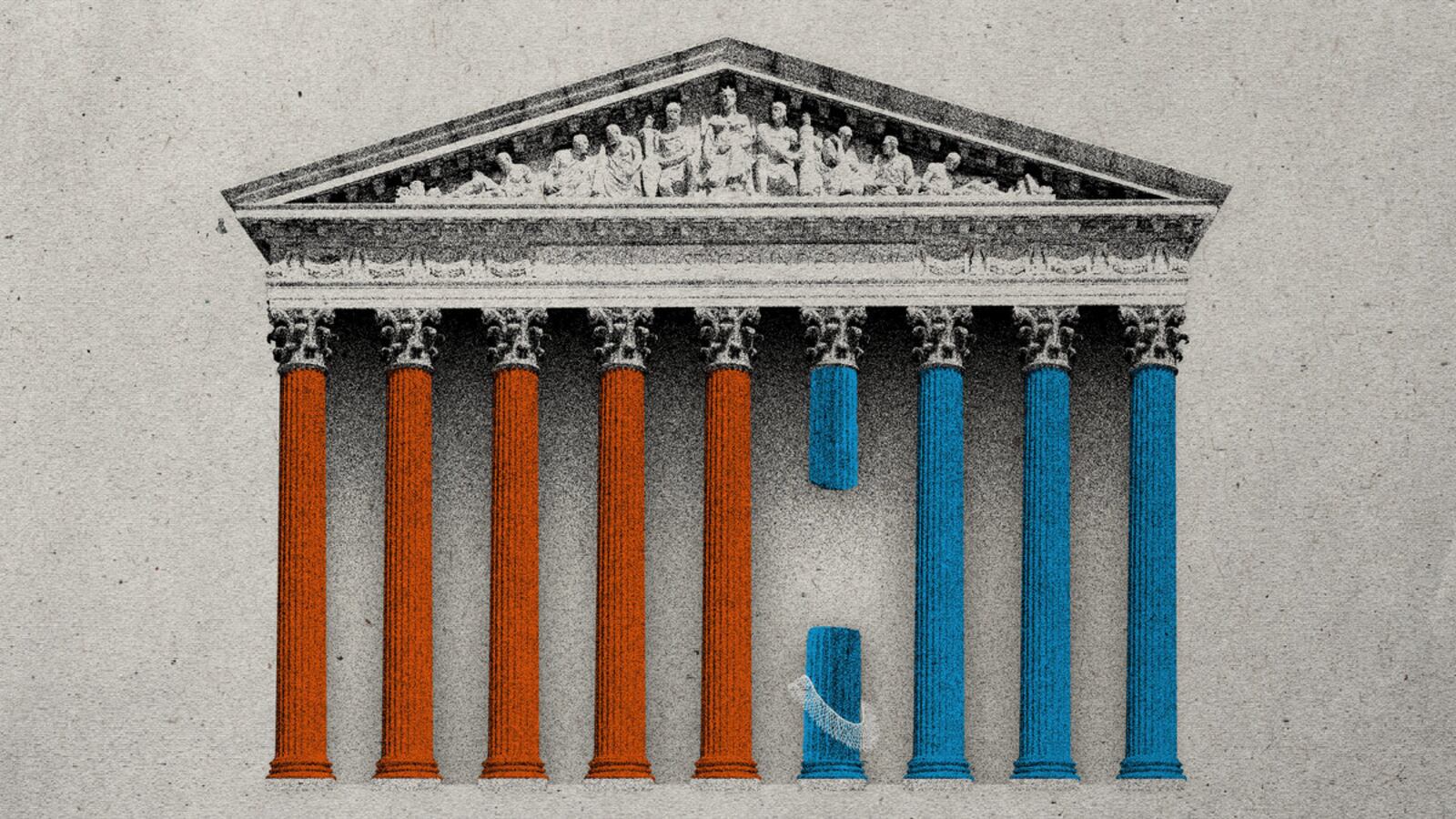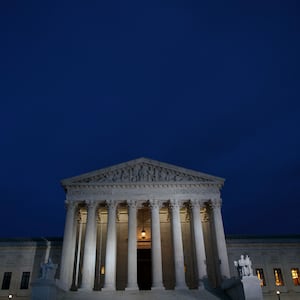Facing what they acknowledge to be a nearly impossible task of blocking President Donald Trump from filling a Supreme Court vacancy, Senate Democrats are divided over what precise tactics they should deploy in the days and weeks ahead.
On a caucus call Saturday, members laid out two types of approaches that they thought would best suit the party in its efforts to stop the president from filling the seat of Justice Ruth Bader Ginsburg, who died on Friday from complications of pancreatic cancer. One faction felt that a dramatic show of resistance with overt political threats would provide the pressure needed to at least slow down the march of Senate Republicans towards confirming Trump’s inevitable nominee.
Another faction, composed mainly of moderates, felt that members should stay squarely focused on the implications that the confirmation would have on health care—arguing that the public, especially in key swing states, would be moved by fears that a new court (and even the current eight-member one) could allow for the full destruction of the Affordable Care Act.
“Those kinds of conversations are going on as we speak,” said one senior Democrat privy to the conversations. “Some want to keep the focus on the impact the court will have on health care, others want one or more message-type events to try and clarify what exactly is at stake.”
The divide was confirmed by two other sources, one of whom downplayed the disagreement as part of standard strategy sessions. A separate source, who spoke on condition of anonymity to describe the contents of the call, said that an additional fear was expressed by some members over the party openly contemplating adding court seats as retribution for Republicans filling Ginsburg’s post.
“There was a discussion of, ‘OK, if we talk through this and lay out the things we are willing to do, what happens if we lose?’” the source, a Senate Democratic aide, said. “That’s an obvious concern because we’ve just given [Senate Majority Leader Mitch] McConnell the basis and moral authority to go do it himself. Suddenly, it’s an eight-three court.”
Caught in the middle of the schism is Minority Leader Chuck Schumer. The New York Democrat has implored members to push back vociferously against McConnell’s plan to hold a vote for a nominee this calendar year. But his team also recognizes the acute pressure coming from the left to pursue political and constitutional retribution if a confirmation does take place and Democrats subsequently take back the presidency and control of the Senate.
Schumer, in his statements, has said that every option is currently on the table, which aides have explained is a deliberate signal that he is not ruling out such agenda items as adding more seats to the Supreme Court, expanding statehood to Puerto Rico and Washington, D.C., and a rule change to end the legislative filibuster. But privately, few if any on Capitol Hill see those outcomes as viable, at least until after the election results come in and the confirmation fight commences. It was noted by more than one source that only one senator—Massachusetts Democrat Ed Markey—has, since Ginsburg’s death, explicitly endorsed the idea of adding Supreme Court seats.
In an interview with The Daily Beast on Monday, Sen. Sheldon Whitehouse (D-RI) who is a member of the Judiciary Committee through which any confirmation fight will go, said that talks of adding Senate or court seats have taken place. But he also said it was premature to hone in on any remedial option.
“I would say that if they go ahead as they have threatened, they should expect to forfeit any standing to complain in the Democratic-controlled Senate,” he said of Republicans. “You can’t have a situation in which rules, traditions and precedents don’t matter when Republicans are in charge but they get to blow the whistle if we violate those things when we are in charge.”
“There are lots of options here,” Whitehouse added, “and I don't want to lock in on one.”
Whatever hashing-out of strategy that Democrats did on their Saturday call, they returned to Capitol Hill on Monday relentlessly on message. Lawmakers batted away questions about what might be “on the table” next year should the GOP get their judge by saying they wouldn’t address hypotheticals. Of the six Democrats approached by The Daily Beast, none were eager to discuss much of anything beyond the implications of the court vacancy for health care and other key issues—and the lingering hope of getting enough Republicans on board to block Trump’s pick.
“We have to learn how to take one battle at a time,” Sen. Brian Schatz (D-HI) told The Daily Beast. “We have to try to win this one, if we can, and I'm not giving up on this. And then failing that, we have to win the Senate and the presidency. And then we'll evaluate our options.”
There’s also a notion among Democrats that an aggressive campaign of resistance to Trump’s pick that underscores the big-picture stakes of the court fight is not mutually exclusive to a focus on bread-and-butter issues like health care.
“This is fairly apocalyptic when it comes to regular people's lives, so that's how we've got to approach this,” said Sen. Chris Murphy (D-CT) of the high court vacancy. “We're gonna have to run a grassroots campaign to stop this nomination from happening, and then make sure that anybody that supports ramming through a judge in the middle of an election pays a price for it at the polls… Your public advocacy campaign on the nominee is going to have to be dovetailed with your electoral strategy.”
But there’s a sense in many corners of the Democratic caucus that spending time talking up a hypothetical response of additional court seats or D.C. statehood is a political loser, and backs Democrats into the fight that Republicans want to have—not the fight that will actually help the party pick up the seats they would need to end the filibuster or expand the court in the first place.
“This is not a political battle. It's not an ideological battle necessarily between Mitch McConnell and our Congress and the President and his folks,” said Sen. Tom Carper (D-DE), who said that the stakes of the fight come down to issues like health care and labor rights. “I think our responsibility is to make sure those consequences are understood.”
Asked if the Democratic caucus is on the same page as the battle lines of the confirmation fight begin to take shape, Schatz gave a definitive yes.
“I think we know we have the high ground and we're not going to cede it. And we're not going to be baited into hypotheticals about next spring,” he said. “That's what they want us to talk about—hypotheticals next spring. There's a live crime being committed, and they want to talk about what we will do in six months and make a bunch of accusations so that it seems like both sides are performing the procedural violence.”








